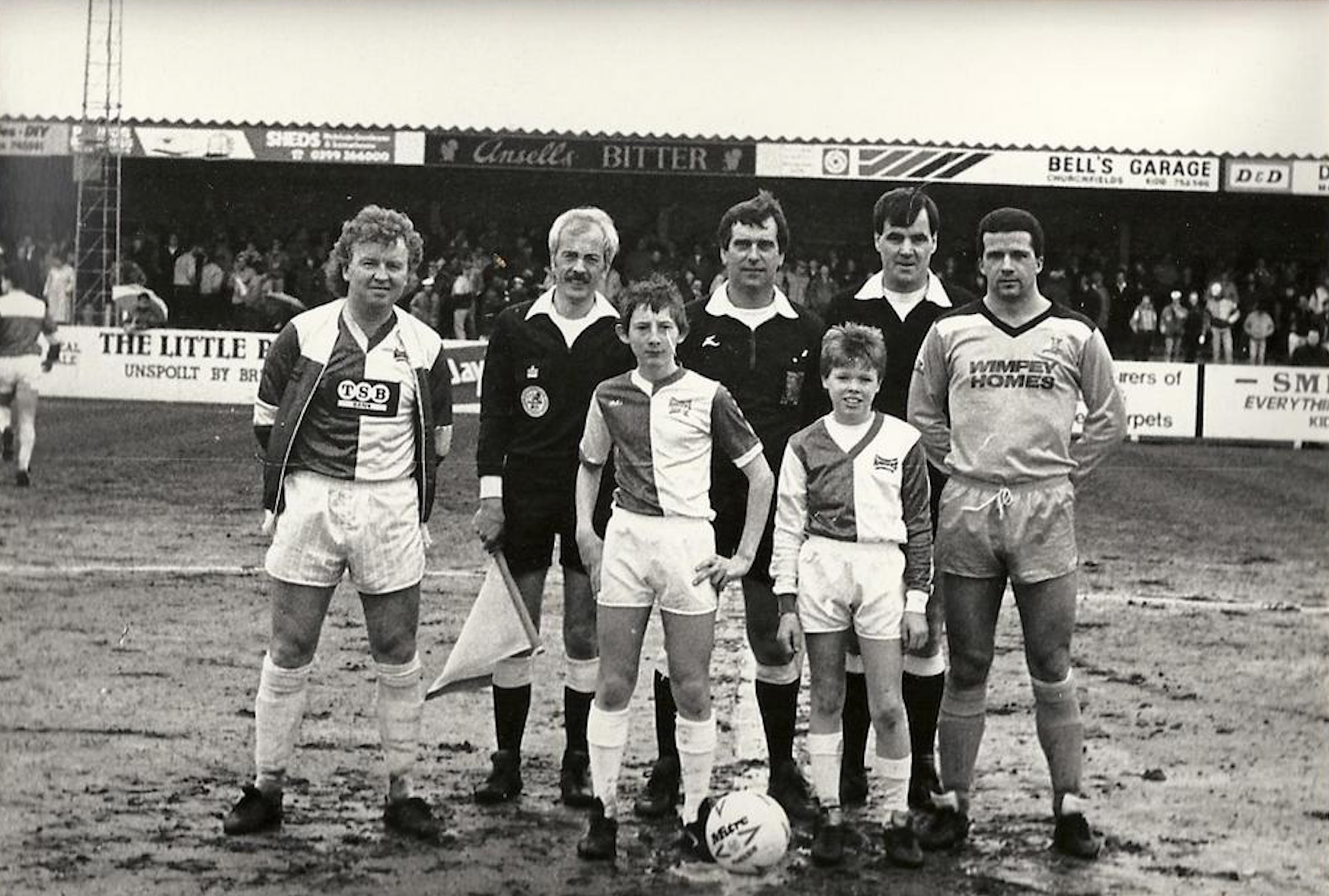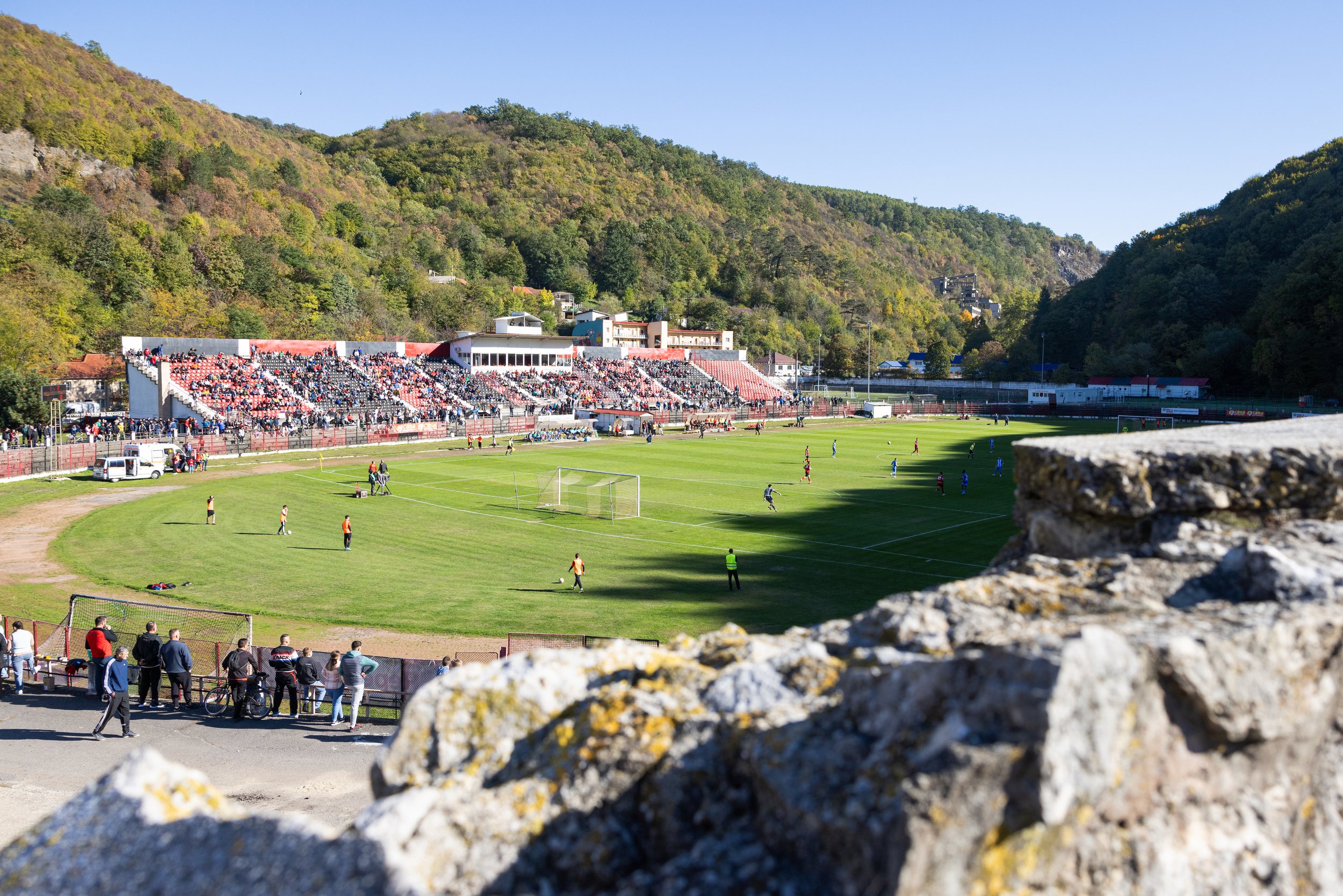Kidderminster Harriers: Passed life

Words: Mike Bayly
Images: Mike Bayly
Cover image:. A young Mike Bayly (centre left) as Kidderminster mascot. 1988.
On Saturday, my brother and I visited our parents prior to watching Kidderminster Harriers v Buxton.
We met at the King and Castle public house in Kidderminster Town station, part of the Severn Valley Railway heritage line running from Kidderminster to Bridgnorth.
It’s a magnet for rail enthusiasts. There are stalls selling memorabilia and a coffee shop displaying gas lamps, finials and nameplates, salvaged relics of a vanished Britain in a town where the once dominant carpet industry has been reduced to derelict factories and a museum.
After lunch, we headed to the platform to watch a departing locomotive. Despite the bygone surroundings, I felt an acute sense of passing time.
My parents are approaching their late seventies. They were teenagers when Beeching’s rail cuts were announced in the 1960s in favour of an expanded road network.
©Mike Bayly/ Terrace Edition. Severn Valley Railway. Kidderminster.
Public outcry wasn’t reserved for route closures. There was a fear that rural England, a backbone of national identity romanticised by the steam train, would be lost to modernisation.
I walked to the end of the platform as the vintage carriages slowly disappeared from view. In the distance were the floodlights of Aggborough Stadium, home to Kidderminster Harriers FC since the late nineteenth century.
A rare and reassuring constant in an ever-changing world.
I first visited Aggborough in 1987. Mum took us to home games, where we would sit on wooden benches above a paddock in the ancient main stand.
In hindsight, I wonder what it must have been like for her to watch football in a male-dominated era synonymous with caged terraces and hostile crowds.
©Mike Bayly. Mr Tee records. Kidderminster.
The non-League game was largely cocooned from these nefarious aspects, but attending matches during this period as a lone female with children was still something of an outlier.
As the years advanced, we were allowed to attend games by ourselves. Occasionally Dad would drive us to Kidderminster.
He made little attempt to conceal his lack of interest in football, choosing to spend the afternoon in Mr Tee Records (or Mr Tee’s Rock Stop as it was then known), a nirvana of second-hand music and entertainment merchandise on Blackwell Street.
It was a place to lose yourself in nostalgia for a few hours. On the occasions I went with him, Dad rarely seemed more content. We shared some of our closest father-son moments there.
When Dad wasn’t available, we would catch the Midland Red bus from Ludlow, slowly climbing the South Shopshire hills and descending into Worcestershire through Cleobury Mortimer, Far Forest and the impossibly pretty Georgian riverside town of Bewdley.
©Mike Bayly/ Terrace Edition. Kidderminster Harriers vs Curzon Ashton.
Travelling alone with friends to a football match was a rite of passage, the bus journey an integral part of the adventure. Conversation would swing between the performance of our 5-a-side team to the latest Sega console releases.
Sometimes we would arrive in Kidderminster early and head to the now demolished Forest Glades Leisure Centre. Or amble around the town’s pedestrianised shopping centre, popping into Our Price to browse the latest 7-inch singles.
Football was increasingly about the day out. Looking back, my fondest memories weren’t attending the actual games, but the coming-of-age ritual around it.
Kidderminster felt like a second home. A home where a shy and awkward teenager felt a sense of excitement, belonging and independence.
My brother and I joined our friend, Terry, and his son, for the Buxton fixture. Terry regularly accompanied us on our teenage trips to Aggborough and still attends when work allows.
©Mike Bayly/ Terrace Edition. Kidderminster Harriers vs Buxton FC.
By contrast, my visits have been progressively sporadic. I was last here on a sunny afternoon in April for a 3-0 win against Curzon Ashton.
Promotion optimism was in the air. This Saturday was grey and damp. The floodlights were on before kick-off. In September.
A singer gamely performed Oasis covers to a raid-sodden audience from the back of a lorry. Another long season in National League North beckoned.
I took stock of the scene. The ground and its environs are barely recognisable from the 1980s. Gone is the perimeter racing track, Cowshed and 1930s main stand, replaced by a modern functional stadium.
Gone is the nearby cattle market, replaced by a housing development. Time has also robbed us of beloved club characters we grew up with, including stadium announcer ‘Captain Crazy’ and Brian Murdoch, responsible for Harriers’ famous cottage pies.
©Mike Bayly/ Terrace Edition. Kidderminster Harriers vs Curzon Ashton.
Spiritually, there were familiar echoes. But in many respects, I felt like a stranger gatecrashing a private party.
Aggborough had changed. More importantly, I had too.
I could easily become maudlin about the Kidderminster of my childhood. Now in my fiftieth year, I occasionally feel detached from a world geared towards a new generation.
In these periods of identity crisis, the past feels like a welcome refuge. But time can draw a flattering veil over years gone by.
Football, as much as anything, has made me accept change is inevitable and should be embraced. The world continually moves on. So have I.
©Mike Bayly/ Terrace Edition. Kidderminster Harriers vs Buxton FC.
While reluctant to admit it, football is no longer my focal point. I have developed other interests and re-evaluated my priorities.
For as long as I can remember, the game was all-consuming. Any attempt to adjust or modernise it was treated as a personal imposition.
Now I accept this is a futile, even selfish view. No generation has immutable cultural authority over others.
Who am I to tell the legions of younger Harriers fans in the ground against Buxton that football was somehow better in an arbitrary age I lived through by chance?
They attend Aggborough with the same starry-eyed passion I once had after setting foot there all those years ago.
Maybe this is the biggest epiphany of growing older: it isn’t the past I miss. It’s my youth.
©Mike Bayly/ Terrace Edition. Kidderminster Harriers vs Curzon Ashton.
After the game, we headed back to the station café. We discussed Buxton’s added time equaliser that salvaged the Derbyshire side a 2-2 draw. My brother said it encapsulated four decades of crushed optimism.
Crushed optimism is an occupational hazard for most football fans. I looked at the resting locomotive behind us and felt slightly more sanguine.
Kidderminster Harriers anchored many of my happiest times. I remain deeply sentimental about the club. But it has transitioned from centre stage to bit part role in my life.
For now, at least. I wondered how many more get-togethers there will be in Kidderminster. I know a point will come when they stop happening.
I know a point will come when I no longer watch my boyhood team. You don’t need to be in the presence of something for it to stay emotionally relevant.
My family and friends were integral to my relationship with football. Or perhaps, on reflection, it was the other way around. Those memories will always stay with me, whatever the future holds.
©Mike Bayly/ Terrace Edition. Kidderminster Harriers vs Curzon Ashton.
©Mike Bayly/ Terrace Edition. Kidderminster Harriers vs Buxton FC.
©Mike Bayly/ Terrace Edition. Kidderminster Harriers vs Buxton FC.
©Mike Bayly/ Terrace Edition. Kidderminster Harriers vs Buxton.
©Mike Bayly/ Terrace Edition. Severn Valley Railway. Kidderminster.
Mike is on X and Instagram: @mike_bayly

















